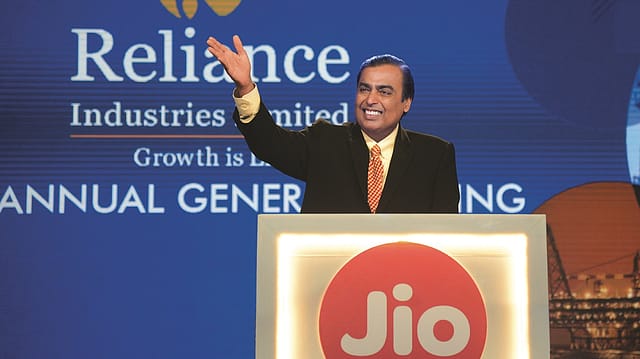Jio has the culture of a startup, but we have a financially strong parent: Ambani
ADVERTISEMENT

In the heyday of Infocomm, the central theme appeared to be that services were going to be really affordable. Will you be carrying this forward into Jio as well?
Jio enables digital life. Our simple goal is that you have to love our service. What all our young people want to achieve is to create that linkage with each one of our consumers so that they cannot live life without Jio. It integrates with your life. So it is not about affordability… it is about creating that delight for every single individual which says ‘Jio is not like any other product’; it is an essential infrastructure. Our leadership team is aiming to make sure that every customer is satisfied and sees value for himself in our offering.
And that the opportunity and the value for each one will be different. Let me give a few real life examples: A Bollywood star could show me all his work in one place through our cinema app. A doctor was able to see a patient’s X-ray on our health app and give real-time advice even when on holiday in Pune. He loves Jio. The patient loves Jio. For a student and teacher, they can do a video call and resolve a query. Like my daughter, at Stanford, does for accounting, her new subject.
These are early signs, but we believe this will become a way of life for everybody in the world, and India should not fall behind. With Jio, we will have covered more than 90% of Indians. So this will be the first time that we run the race for a better quality of life for all our people at par or may be ahead of the world.
Our network also provides opportunity for young startups to realise their ideas on top of this infrastructure. In a way, ours is a startup in a very, very strong company. Jio is a startup that is enhancing value for the Reliance shareholders.
That is the big difference [from Infocomm]. We have a culture of a startup, but we have a parent that is financially strong, who doesn’t need to monetise, so you keep it on an ongoing basis and nurture this baby till it becomes strong.
The [Jio] opportunity is a two-way [street]—enhancing your own lifestyle as well as livelihoods. We are not far from the day when this Internet ecosystem will also be the largest employment creator. It will do a lot of things which were done in the old world but in a much more efficient fashion.
You said you never think about the past, but what is that you have learnt from Infocomm?
What I have learnt is that it is much better to go with the judgment of our younger team leaders, than to impose our own thoughts onto them. When I was 45 years old, I might have said this is it. Now I firmly believe that you are better off when you listen to the next generation.
You seem to be offering a high-end technology at a much cheaper price. So how does the economics play out here?
I think the idea of cheap and costly is only in people’s perceptions. The reality is we have to generate value. In the first few months, we had Point of Interconnect issues due to competitive forces and the service was not perfect. And if the service was not perfect, we have no right to charge. We think we have solved it majorly and as our fellow operators cooperate, we will be able to deliver our targeted service to our customers.
We are also more like a new-world software business. The way you deliver services in this new world is that you should first satisfy the customer, generate value for them and only after that you start generating a fair return for you service.
That’s been our principle, that’s been Dhirubhai Ambani’s principle for a long time. We create societal value first, customer value second, then employee value, and thence we derive shareholder value. We are a for-profit business, so we have to make a sensible return, but we are willing to be patient to make a reasonable return on the cost of capital. We are not here to make windfall returns or to take a very short-term view of the business.
We have built this business for keeps, which means that there will be many decades of sustainable business, and we are prepared to invest for the first few quarters.
Companies like Google and Facebook have created global footprints and command high valuations. Where would you place Jio?
We think there is space in the world for what we call global platforms and for local platforms. There are certain platforms that are global, search is global, which is what you have mentioned. We think there are certain platforms that are completely local, and as you integrate the local and global platforms and you provide digital services on a targeted basis, those will be completely different models. I don’t know if you have seen Jio Music or Jio Cinema or Jio Money. We understand the need for differentiation at the local level. What will be required in Kerala is different from what will be required in Bihar. That is the journey we are on. Surely there is digital connectivity on the base but on top of that we have got digital services which we offer to a set of targeted and segmented customers in a focussed way.
So we think there is space for both business models and that has been proven across the world. At present, we are focussed on India and making sure we achieve our objectives here.